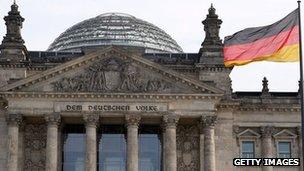Resentment towards Germany
- Published
- comments

Germany is now expected to exercise both political and economic clout
There is increasing frustration and resentment towards Germany. It is criticised for failing to lead, for being a prisoner of its history, for acting selfishly while also being disliked for imposing a culture of austerity on the rest of Europe.
The Germans are aware of this and it is leading to soul-searching.
As the paper Die Welt said, "the Germans are the indispensable nation on the continent".
Charles Grant from the Centre for European Reform , externaldraws a similar conclusion: "Germany is emerging," he said, "for the first time in the EU's history as the unquestioned leader. France is having to adjust to a subordinate role".
But as Die Welt also noted, "our new power is triggering rejection and resentment".
Why the resentment? Germany is the advocate of austerity. It believes that countries need to put their finances in order through cuts and reforms.
In countries like Greece years of hardship lie ahead. German fingerprints are seen as being on their austerity programme. The resentment can be glimpsed at demonstrations, where banners call for Berlin to make further reparations for the war, or in a picture in an Athens store - Angela Merkel in a Nazi uniform.
In Italy, Chancellor Merkel is seen as having helped engineer, along with the European Central Bank, Silvio Berlusconi's departure. Of course it is not as simple as that, but Mario Monti's weakness is that he is seen as "sponsored" by Berlin and Brussels. All the time spent discussing his plans with European officials undermines his standing at home. As an unelected leader he will have to implement deeply unpopular cuts without a mandate. Rightly or wrongly some of the anger will attach itself to Germany.
It did not help that almost as soon as he was elected in Spain, Mariano Rajoy was on the phone to Berlin.
Realignment of EU
Ulrike Guerot, from the European Council on Foreign Relations, external and writing from Berlin, said "this will backfire on us terribly in two or three years' time".
Even amongst some eurozone countries there is increasing unease that Chancellor Merkel and President Sarkozy are meeting almost every week and expounding plans for the future of the eurozone and the EU.
This week the Finnish Prime Minister Jyrki Katainen warned against proposals that bypass the EU. He and other smaller nations fear an EU that is increasingly a Franco-German union with France in a supportive role.
At the same time there is rising frustration that Germany will not allow the ECB to print money to buy the bonds of countries in trouble and to become the lender of last resort.
President Obama has tried to muscle the German chancellor. So has David Cameron. But the Germans, for the moment, will not allow the bank to play that role because they fear a repeat of history - the inflation of the Weimar Republic and all that flowed from it.
Polish Foreign Minister Radek Sikorski added to the pressure, saying "I demand of Germany that, for your own sake and for ours, you help the eurozone survive and prosper… I will probably be the first Polish foreign minister in history to say so, but here it is: I fear German power less than I am beginning to fear German inactivity. You have become Europe's indispensable nation."
When the President of the European Commission, Jose Manuel Barroso, tried to put eurobonds (common European debt) on the agenda he was seen in Germany as trying to force their hand. The German Economics Minister, Philipp Roesler, called his intervention "irresponsible".
More than 'big Switzerland'
Katinka Barysch, from the Centre for European Reform, says that "many in the German government say that leadership consists of spreading Germany's 'stability culture' throughout Europe. They point to the fact that Greece is implementing reforms that were unthinkable until recently, that Italy is now run by a man who praises the strength of the German model."
She goes on to argue that the Germans do not want to be the ones who impose austerity and reforms on their neighbours. "They clearly do not enjoy being unpopular."
Again the Germans are agonising over this leadership role. Here is a German paper again: "Scarcely any nation is less suited to this task than the contrite Germans, who spent decades pretending to be smaller than they really are and who would prefer to be just a big Switzerland in foreign policy terms. But now they're suddenly realising that the world is relying on them to save the euro and avert a disaster for the global economy.
"The Germans are going through a crash course in being a leading power… with their focus on austerity and their refusal to permit a bigger role for the ECB, the Germans are as isolated as the Americans were with the Iraq war."
For post-war Germany it is an acute dilemma. Never has their influence and power been greater. Their modern culture makes them reluctant leaders. And yet that is what is demanded of them and, at the same time, the fear is that the EU is becoming a German union.